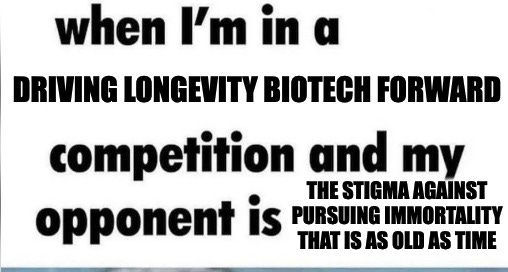LongBio Culture Clash: A Look at Public Perception and how to Break it
Exploring why longevity biotech is not as popular as we think it should be
Longevity biotech is a nascent industry. Working in VC, it is very exciting to observe brave founders venturing into the new frontiers, creating LongBio 2.0 companies, and the plethora of new research directions that have grown into notability since I started following the field in 2018. Even more exciting is the theme underlying the whole longevity biotech field - we are working not only to extend life per se, but functionally eradicate disease.
In agreement with this tweet, I see longevity extension as one of the three main big challenges of human civilization, the other two being nuclear fusion and general AI. However, while all of those challenges captivate futurists and laymen alike, and bring considerable capital in, longevity biotech is undoubtedly lagging behind. The main reason of course is that, as compared to general AI and even fusion, the understanding behind aging biology is, from a bird’s eye view, ELI5-level at best. Biology is hard, and considerable research is needed to be conducted to break LEV. But that’s not an issue, we are financing cutting-edge research…right? Well, not quite.
The National Institutes of Health, the primary agency of the United States government responsible for biomedical research, requested $62.5 billion for 2023, which is a considerable sum of money being spent on advancing our understanding of disease. Within that, the National Institute of Aging, a division of the NIH focusing on aging research, has received about $4 billion, so about 8.5%. There are 21 institutes within the NIH, so that sounds like a good allocation.
But wait, isn’t aging the cause of most diseases, shouldn’t it get more than $4 billion from the main biomedical research funding body? Well, dear reader, would you be surprised that actually, aging research gets even less? As per this Spannr article (great resource btw, subscribe if you haven’t already), only about $337 million, or about 8.5% of the requested NIA budget are devoted to basic research of aging biology - the kind of research that could allow the breakthroughs necessary to stop drinking green sludge and following arduous exercise regimens to claim a 0.5 decrease on your aging clock. Most of the NIA funding actually goes to Alzheimer’s disease research.
This is an obscenity, you would rightfully say. This is a conspiracy by the Big NIH to limit…hold on right there. It is easy to blame politicians, secret societies, or money-seeking Big Pharma companies for limiting aging biology research, but the explanation for why that is the way it is may be much simpler - longevity extension is just not popular.
Let’s check the statistics
Below you can see a Google Trends graph for search topics ‘Longevity’ (red), ‘Anti-aging product’, (blue), and ‘Immortality’ (yellow), between the year 2004 and now.
‘Healthspan’ and ‘Longevity Escape Velocity’ are even lower, so I have not included them to forego the inbound metaphors about flatlines or something. Let’s add Alzheimer’s disease (green) to this graph:
Here you can clearly see potentially the main reason why most of NIA’s funding goes to Alzheimer’s. What happens if we change ‘Alzheimer’s disease’ to ‘Cancer’?
Clearly, we can’t escape the flatline metaphor. It is important to mention that while ‘Longevity’, ‘Anti-aging product’, and ‘Immortality’ are Search topics, which are basically congregations of multiple search terms by theme, ‘Cancer’ here is just a search term for that particular word, so the difference is even more staggering. The results may be skewed by the astrological meaning of Cancer, but sadly it’s impossible to separate the two, and it turns out that people care more about ‘Cancer’ than about ‘Astrology’ (purple), so we will let it slide:
To cement the notion that longevity biotech, aging biology, and chasing immortality is a niche, underground industry, here is a comparison of the three aforementioned topics with ‘Techno’ (green):
It is widely known that techno was much more popular between the 1990s and the mid-2000s than it is now, so again, as the name of this substack illustrates, techno and longevity are not as different as one might’ve thought!
But that’s beside the point. The actual point here is that for whatever reason, people largely don’t know and/or don’t care about lifespan extension. Things get funded by both the government and the invisible hand of the market based mostly on the people’s perception of the importance of those things. While I would love techno producers like Amrtum or Amelie Lens to be as popular as David Guetta, it’s just ain’t happening, as I’ve promptly cemented above with statistics. Thus, how do we expect basic aging biology research to be funded at the same level as Alzheimer’s or cancer?
Yet again, the question arises - why do people not care? Mostly everyone is perfectly aware that both Alzheimer’s and cancer incidence skyrocket with age, no one really likes or wants to age. Even more than that, the success of skincare, fashion, and wellness industries can be seen to be a testament to that people actually do care. So why not focus on what matters? The reason is probably, as compared to fusion energy and general artificial intelligence, concepts that have arisen in the last century, longevity extension attempts have been with us since the dawn of humanity. Countless adventurers looked for the Fountains of Youth. Alchemists, the forefathers of modern scientists, put the search for the Philosopher’s Stone as their top priority. But to the best of our knowledge, all of them failed. What did get immortalized is this failure.
The culture clash
Culture is the defining feature of humanity. We express ourselves to project the infinite complexity and beauty of our collective consciousness for all of us to observe, hear, feel, and get inspired to do more of it. In his most famous book The Selfish Gene, evolutionary biologist Richard Dawkins famously coined the term “meme”, which “conveys the idea of a unit of cultural transmission, or a unit of imitation”. Dawkins equated memes to genes, it can be further said that memes are cultural viruses or transposable elements. We of course all know what a meme is, and I think everyone can agree on the power memes have over our life.
Well, longevity extension (and the dangers thereof) is one of the oldest memes there is. The oldest written story that survives to this day is the ancient Mesopotamian epic poem, the Epic of Gilgamesh, a great part of which is about seeking immortality. I’m not going to go into the details of the story - you can find the full text here, or countless recaps online. However, there are three facts that can be inferred from the Epic of Gilgamesh. First - there is a really good album by Simple Symmetry, my favorite psychedelic dark disco duo, called Gilgamesh, which you should check out. Second - as per the story, immortality is unattainable, and humanity should not seek it. Third - the quest for immortality is indeed as old as time. The second and third points are central to this piece - immortality has been sought after for so long that it became the first ‘cringe’, and this has been plastered all over culture from the dawn of time.
Foregoing most of the time periods between Gilgamesh and Gilgamesh, let’s focus on our modern popular culture, how does it view life extension and immortality, positively or negatively? Well, if we look at the most important works of popular fantasy in recent times, we can see that immortality seekers are the all-powerful, evil characters - Sauron in ‘Lord of The Rings’, Voldemort in ‘Harry Potter’, Dracula in the eponymous novel by Bram Stoker and countless adaptations.
All of these villains are lost in their hubris and are willing to achieve ‘the unachievable’ by any means, even if it means death and despair to everyone else. Popular sci-fi doesn't give longevity extension and immortality any justice as well, just look at the latest iteration of the most meaningless movie with truly groundbreaking graphics, Avatar 2, where humans shifted from mining unobtainium to killing sentient, peaceful whales to extract longevity juice from their brains.
There are countless more examples, with few positive ones. The ones that are positive, like Asgardians and Eternals (somewhat) in the Marvel Cinematic Universe, are typically gods or similar well-beyond-mere-mortal creatures. No human should have the ambition to become a God according to most religions, so these representations are not truly positive.
It is easy to dismiss culture, especially pop culture, as something superficial and not meaningful, we are doing cutting-edge science right here after all, but that would be a big mistake. Remember, memes are our minds’ genes, and thus culture is extremely important to how we prioritize the tasks humanity works on. With such representation in culture, how can longevity biotech be taken seriously by the people? In their eyes, we are not only not closer to life extension than alchemists were to the Philosopher’s Stone (which is kind of true), but also that we are caught up in evil hubris, working to extend lives of the rich, and trying to become like Gods. While this is largely a hyperbole, this conditioning is imprinted into our brains. So how do we fix this?
Solutions?
Any deeply held belief can be broken by a sufficiently convincing argument. Everything is impossible until it isn’t. My favorite example is another concept that humans probably dreamed of since the dawn of time - flight. For thousands of years it was thought to be a certain impossibility, dreamers were lambasted as unhealthily ambitious (see Icarus). The greatest minds dabbled with the idea only to fail. When hot air balloons appeared, people were awed, but it still wasn’t flying, more like wireless sailing. Then suddenly in 1903, the Wright brothers made the impossible possible.
So all the longevity biotech industry needs is a breakthrough, right? Right, but as I previously said, biology is hard. We will get there eventually, the question is how long will it take? I’m certainly bullish on this in the long run, but I want to be one of the people who benefit from it, I want my loved ones to benefit from it, and so do you, my dear reader. So while there is a real possibility that there is some Redbull-fueled postdoc at some lab in some corner of the world on the precipice of a major discovery, we need many more of such postdocs to speed this up, for which of course - coming back full circle - we need funding! So how do we shift the Overton window? Here are my choices:
We don’t. Longevity biotech slowly crawls from obscurity to a breakthrough only to be destroyed by moralists and death cultists.Activism and lobbying. Activism was what made climate change important in the minds of people, despite an actual conspiracy against it, so the same thing can be done for longevity biotech. I applaud initiatives like A4LI for spearheading the effort on this front, and I’m sure we’ll get more of that in the near future.
More longevity-positive professionally produced content. A lot of groups have realized it before me, like the people who made Limitless with Chris Hemsworth (cold plunges can make you a God too!), JellyfishDAO, that upcoming BBC documentary, etc. Eventually, as the window shifts, we will get more and more examples of positive representation in pop culture.
A little bit more longevity-risque content, too. Many people are cautious about headlines like ‘Who wants to live forever? Only billionaires like Jeff Bezos’ and rightfully so. But no press is bad press, and while in excess that can have a highly detrimental effect on the field, in moderation this gets people talking, thinking, and being curious, which over time leads to change. Spice up the discourse!
More memes and viral content. Memes are getting wilder, but the memetic community in our field is rather lacking. Here I think we should learn from another hype-driven industry, crypto. All of those dogs, waifus, and degenerate humor drive engagement, making people who potentially don’t really have a say in the industry contribute. As crypto and longevity get intertwined more and more through initiatives like VitaDAO, I think we will get more of that also. Non-memetic (in the contemporary sense) viral content, such as that ‘young’ filter on TikTok, may be even more powerful since it is able to connect to a larger audience. Maybe that is what will take to convert Elon to our cause.
More short-form content. Speaking of TikTok, I think we need to fully embrace Gen Z and Alpha culture. The current biggest longevity influencers are great, but they are mostly facing the field internally, being too sciency and/or focusing too much on optimizing wellness. We need a Longevity Tik Tok house, where participants try to beat Bryan Johnson in his Olympics all while chugging Bud Lights. Being a Gen Z on a technicality, I think about this part the most. Just look at what short form content is doing in chess, it drives the game’s popularity even better than the Queen’s Gambit.
Finally, we can word the problem differently. I’m really bullish on terms like healthspan because they dissociates from the mysterious and associates with what people actually care about. If we come back to Google Trends, and add the ‘Preventive medicine’ topic (green), we that people are very much on board with the idea, it may just need different framing.
Since I only have a superficial understanding of media, marketing, and PR, I’m sure there are much better, more convoluted ways to make longevity sexier. If Cambridge Analytica could manipulate elections on such a level, what stops us from making everyone longevity maxis, especially since it is ultimately for a common good?
I hope as the field grows, we attract more and more people from all walks of life, which could drive this transformation. Shoutout to initiatives like the Longevity Biotech Fellowship that strive to become the first incubators for that kind of change. To poetically conclude this post - you’re a keeper if you got this far, reader - I will leave you with a meme:














